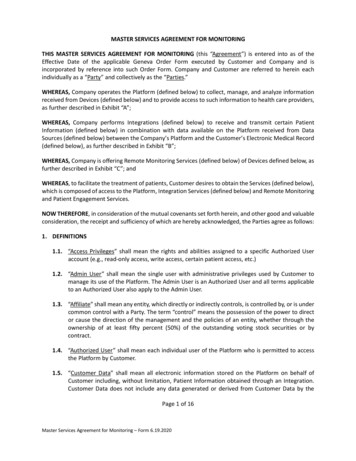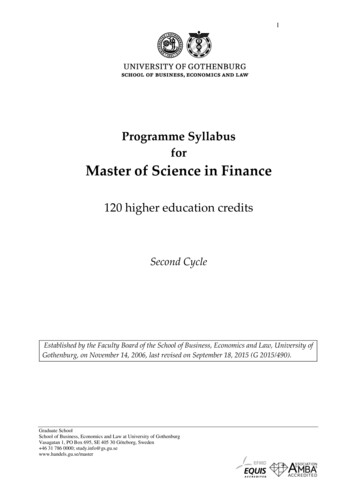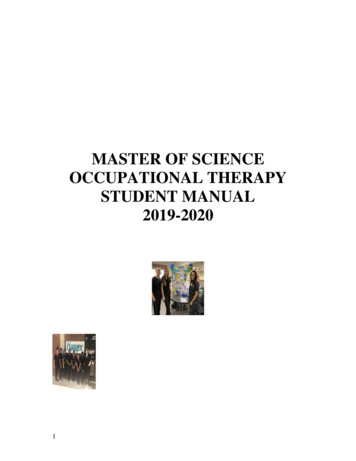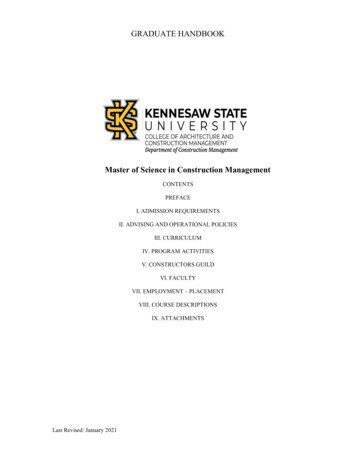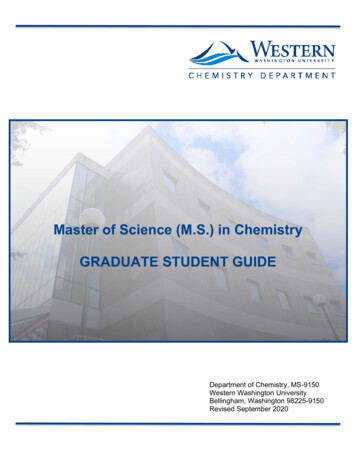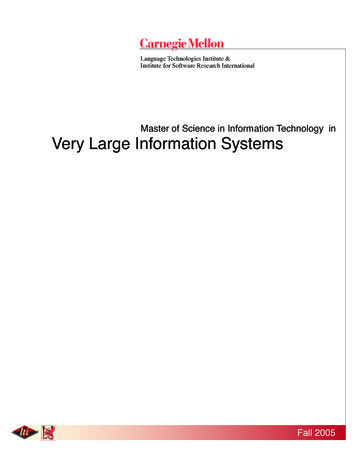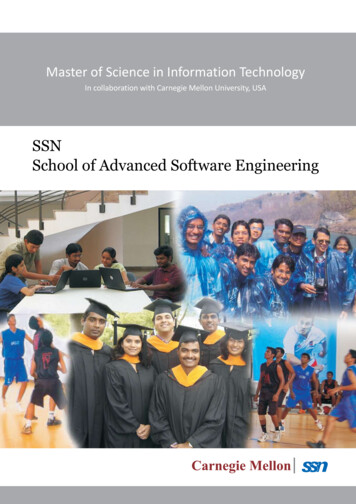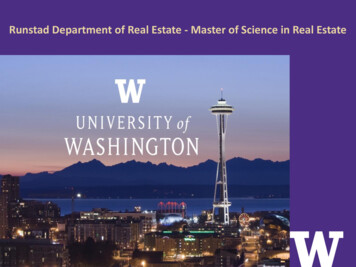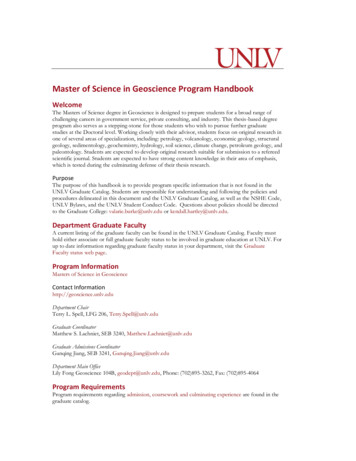
Transcription
Master of Science in Geoscience Program HandbookWelcomeThe Masters of Science degree in Geoscience is designed to prepare students for a broad range ofchallenging careers in government service, private consulting, and industry. This thesis-based degreeprogram also serves as a stepping-stone for those students who wish to pursue further graduatestudies at the Doctoral level. Working closely with their advisor, students focus on original research inone of several areas of specialization, including: petrology, volcanology, economic geology, structuralgeology, sedimentology, geochemistry, hydrology, soil science, climate change, petroleum geology, andpaleontology. Students are expected to develop original research suitable for submission to a refereedscientific journal. Students are expected to have strong content knowledge in their area of emphasis,which is tested during the culminating defense of their thesis research.PurposeThe purpose of this handbook is to provide program specific information that is not found in theUNLV Graduate Catalog. Students are responsible for understanding and following the policies andprocedures delineated in this document and the UNLV Graduate Catalog, as well as the NSHE Code,UNLV Bylaws, and the UNLV Student Conduct Code. Questions about policies should be directedto the Graduate College: valarie.burke@unlv.edu or kendall.hartley@unlv.edu.Department Graduate FacultyA current listing of the graduate faculty can be found in the UNLV Graduate Catalog. Faculty musthold either associate or full graduate faculty status to be involved in graduate education at UNLV. Forup to date information regarding graduate faculty status in your department, visit the GraduateFaculty status web page.Program InformationMasters of Science in GeoscienceContact Informationhttp://geoscience.unlv.eduDepartment ChairTerry L. Spell, LFG 206, Terry.Spell@unlv.eduGraduate CoordinatorMatthew S. Lachniet, SEB 3240, Matthew.Lachniet@unlv.eduGraduate Admissions CoordinatorGanqing Jiang, SEB 3241, Ganqing.Jiang@unlv.eduDepartment Main OfficeLily Fong Geoscience 104B, geodept@unlv.edu, Phone: (702)895-3262, Fax: (702)895-4064Program RequirementsProgram requirements regarding admission, coursework and culminating experience are found in thegraduate catalog.
Program HandbookTable of ContentsWelcome . 1Purpose . 1Department Graduate Faculty. 1Program Information . 1Contact Information . 1Program Requirements . 1Graduate Program Administration . 3Graduate College Policies. 3Petitions for Departures from the Rules . 3Useful Resources. 3Admissions to the Geoscience M.S. program. 3Admission Requirements . 4Admission Contingencies . 4International Students . 4Program Timeline . 4Degree Progression Procedures . 5Upon Admission: Select Thesis Advisor . 5Prior To and During the First Semester . 5During the 2nd Semester . 6During All Semesters Prior to the Final One . 6During the Final Semester . 7Annual Review Procedures . 7Additional Program Information . 7Financial Support . 7Teaching Assistantships . 8Fellowships . 8Research Assistantships . 8Other Financial Support . 8Academic Policies . 9Graduate Student Responsibilities for Deadlines and Forms . 9Adherence to Student Academic Misconduct Policy . 9Required and Expected Performance of Graduate Assistants . 9Course Grades . 9Student Progress Evaluations . 10Description of M.S. Student Requirements . 10M.S. Degree Program . 10Annual Committee Meetings . 11Thesis Proposal . 11Suggested Format of Thesis Proposal . 12Proposal Defense Examinations . 12Theses . 13Thesis Defense . 14University Resources . 15University Policies and Procedures . 17Handbook Information . 17Appendix 1: Proposal Cover Sheet Example . 182
Program HandbookGraduate Program AdministrationThe Graduate Affairs Coordinator of the UNLV College of Sciences is a valuable contact fornavigating graduate school and serves as a liaison with the Graduate College. The coordinator canhelp answer questions about forms and policies. The current Coordinator's contact information isavailable on the UNLV College of Sciences webpage (sciences.unlv.edu). The Graduate Program inthe Department of Geoscience is administered by 1) A Graduate Admissions Coordinator, whoseresponsibility is to oversee student inquiries about graduate school in the Department and theadmissions process, and B) the Graduate Program Coordinator, whose responsibility is to guidestudents through the regulations of their graduate program in the Department at UNLV. The twograduate coordinators are typically Graduate Faculty members in the Department of Geoscience.Graduate College PoliciesThe UNLV Graduate College sets forth policies and deadlines in the Graduate College Catalog, whichgoverns all graduate students at UNLV. New graduate students will follow the edition of the GraduateCatalog current for their year of entrance to UNLV. With Department and Graduate Collegeapproval, the Graduate Catalog in effect during the semester in which degree requirements arecompleted may be used. In addition, the Department of Geoscience has developed the followingguidelines, which are in some cases more rigorous and rigid than those of the Graduate College.These guidelines were generated in order to establish a framework that will assure uniformly highstandards throughout the Department and to permit the best possible education for Geoscience M.S.students. Each student is obligated to be aware of both sets of policies and to review themperiodically so that they are followed to the best of each student's ability.Petitions for Departures from the RulesIt should be understood that the policies of both the Graduate College and of the Department aresomewhat flexible and written petitions for exceptions may be submitted for special cases in whichextenuating circumstances occur. However, petitions for departures from the rules and guidelinesmust be approved in writing by the advisor, committee, Graduate Program Coordinator andDepartment of Geoscience Chair. The Petition must also be approved by the College of Science andGraduate College Deans. Use the UNLV Graduate College Appeal Form available on their website. Ifthe petitions are granted, the policies may be modified, but students should not and cannot rely onsuch a mechanism to circumvent the regulations. Questions regarding any of the policies can andshould be addressed by the student's advisor, the Department Chair or the Department GraduateProgram Coordinator. If the information provided by these sources within the Department is notsatisfactory, M.S. students should make an appointment with either the Dean or Associate Dean ofthe Graduate College in order to have questions answered. Do not rely on hearsay information: see itin writing.Useful ResourcesStudents are responsible for their own graduate education, and are expected to consult all relevantrules and regulations available at UNLV and in the Department of Geoscience. Below are some usefullinks that include policies and procedures relevant to Graduate School. As web addresses frequentlychange, the student should stay up to date with the most recent sites, and is responsible for contactingthe relevant offices directly.1.2.3.4.5.6.7.8.9.UNLV Graduate College: http://www.unlv.edu/graduatecollegeGrad Rebel Gateway: Grad Rebel GatewayUNLV Department of Geoscience web page: http://geoscience.unlv.edu/College of Sciences: https://www.unlv.edu/sciencesMyUNLV for course registration: http://my.unlv.nevada.eduFinancial Aid and Scholarships: http://www.unlv.edu/finaidGraduate and Professional Student Association (GPSA): https://www.unlv.edu/gpsaOffice of Student Conduct: https://www.unlv.edu/studentconduct.Office of International Students and Scholars (OISS): http://www.unlv.edu/issAdmissions to the Geoscience M.S. programThe establishment of standards of admission to graduate programs at UNLV is largely theresponsibility of the Graduate College. Therefore, M.S. students should refer to the appropriate3
Program Handbookgeneral section in the Graduate Catalog, but also be cognizant of the introductory section toGeoscience. The Graduate College receives the credentials of applicants and the Departmentrecommends that an applicant either be denied admission or admitted with one of the followingclassifications: (l) Full Graduate Standing, (2) Graduate Provisional, (3) Conditional Admission, and(4) Non-Degree Seeking Student. For either of the first two classifications there may be deficiencieslisted or graduate course work specified.Admission RequirementsReview of applicants for admission includes evaluation of previous grade point average (GPA),courses taken, Graduate Record Exam (GRE) General Test scores, letters of recommendation, andstudents' statements of interests. The Department generally requires a grade point average of "B" orbetter for admission with graduate standing. Students with less than a "B" average may be admitted ifsupporting data (letters of recommendation, Graduate Record Examination, publications, etc.) aresufficiently strong. GRE General Test scores should be average or better and letters ofrecommendation should be positive. Applicants must have completed a Bachelor's Degree inGeoscience or a related discipline.The requirements for admission without deficiencies are listed in the Graduate Catalog (atgraduatecollege.unlv.edu). The Geoscience Department requires that, at minimum, the student hastaken at least six of the following eight classes or their equivalent: GEOL 220/221Mineralogy/Optical Mineralogy, GEOL 301, Fossil Record, GEOL 330 Geochemistry, GEOL 333Geomorphology, GEOL 341 Structural Geology, GEOL 348 Field Geology I, GEOL 426 Igneousand Metamorphic Petrology, and GEOL 462 Stratigraphy and Sedimentology. In addition, a studentmust have taken an introductory geology class or they may be required to attend GEOL 101 lecturesand serve as a Teaching Assistant (T.A.) for GEOL 101 after admission. A student also must havetaken at least 22 semester credits in supporting sciences, which include Chemistry, ComputerProgramming, Mathematics (Calculus or a higher level), Physics and Statistics.The admissions recommendation made by the Department to the Graduate College may be rejected ifit is judged to conflict with Graduate College standards. Students with a field(s) of interest that isconsistent with a field of research emphasized by a departmental faculty member will be consideredfor admission, if that discipline currently does not have enough participating graduate students to beconsidered filled.In order for a currently admitted graduate student to change from one department to anotherdepartment or program, the student must submit a new application for admission, the requiredapplication fee, and all necessary credentials to the Graduate College. Upon admission, the studentmust withdraw in writing from the original department.Admission ContingenciesConditional Admission is given when additional admission materials are needed. It is the student'sresponsibility to comply with the terms of admission. Admission contingencies vary with each studentand many students have none. The Department and Graduate College must receive all materialsrequired at the time of matriculation no later than the end of the first semester. Progress towardcompletion of deficiencies noted at the time of matriculation should start in the first semester and becontinuous until completed. Deficiencies must be completed as soon as possible. Questions should beaddressed to the Department's Graduate Admissions Coordinator. Students must make their potentialadvisor aware of admission conditions.International StudentsThe Office of International Student and Scholars (OISS) at UNLV provides expert help on navigatingvisa and other issues. International students in the Department of Geoscience should work closelywith the OISS, their faculty advisor, and the Graduate Admissions and Program Coordinators toensure a smooth transition into UNLV Department of Geoscience graduate program.Program TimelineAlthough there is no single time frame for students seeking to complete a M.S., a full-time graduatestudent seeking a Master of Science degree (particularly if a student is funded through the4
Program HandbookDepartment, Desert Research Institute (DRI), or the Graduate College), each student's goal should beto complete the M.S. degree within two years. The regulations are structured for a two-year degreeprogram, as are departmental funding and assignment of office space. If a student enters the programwith deficiencies or works full-time, it is likely that additional time will be needed to complete therequirements. However, departmental funding may not be automatically extended. Therefore, thedepartmental advisor for each student will strive to provide two academic years of support. Thedegree must be completed within six years, or credit for course work completed will be lost.Our two-year limit on office space and M.S. student funding is a reflection of this two-year programand may be extended only with special permission from the Department Chair, Graduate ProgramCoordinator, and the student's entire committee. Therefore, if a M.S. student is active in thedepartment and is working on a thesis, they should enroll in thesis credit hours every semester. Thenumber of credits should reflect the amount of time the student is working on the project, the use ofuniversity facilities, and advisor's time.Also, all students (whether full time or part time) must be continuously enrolled in accordance withGraduate College guidelines, as outlined in "Academic Policies" section of the Graduate Catalog. Iffor some reason the student can not actively participate in course work or thesis research, or if thestudent is off-campus on an external Fellowship (e.g. a Fulbright Fellowship), then the student shouldcomplete a Leave of Absence form from the Graduate College. As stated in the Graduate Catalog,“during the leave of absence, the student should remain in contact with the Department. However, alldegree requirements must be completed within the six- and/or eight-year policy as stated previouslyin the Graduate Catalog".Before enrolling for thesis credit hours, the student's advisor must be consulted to determine theamount and type of work to be completed for a specified number of credits during any givensemester. This should be viewed as a contract, and each semester the advisor will judge whether thestated work was completed. If the work was either not completed or was of an unsatisfactor
The Masters of Science degree in Geoscience is designed to prepare students for a broad range of challenging careers in government service, private consulting, and industry. . The establishment of standards of admission to graduate programs at UNLV is largely the responsibility of the Gradu

